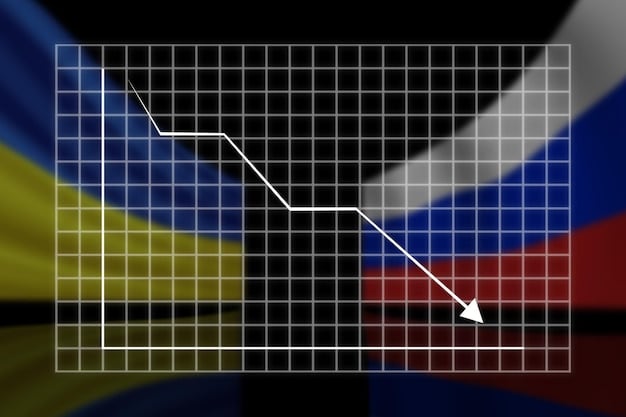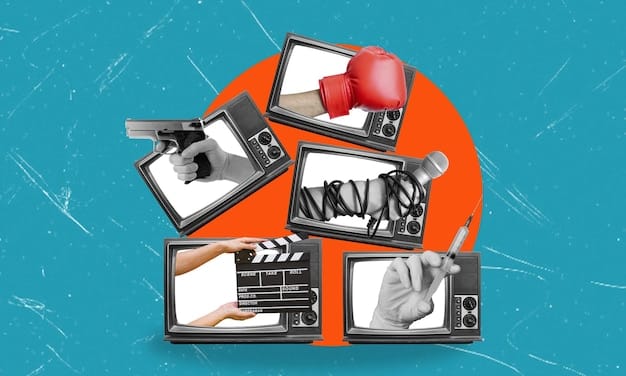Pop Culture Predictions for 2025: A Data-Driven Accuracy Analysis

Analyzing the accuracy of pop culture predictions for 2025 involves examining past trends, expert forecasts, and current trajectories in entertainment, technology, and social behavior using data-driven methodologies to assess the likelihood of these predictions coming to fruition.
As we hurtle towards 2025, it’s fascinating to consider what the future holds in the realm of pop culture. From technological advancements to evolving social trends, the landscape is constantly shifting. But how accurate are pop culture predictions for 2025? A data-driven analysis can provide us with some insightful answers.
Forecasting Pop Culture: The Crystal Ball or Data Analysis?
Predicting pop culture isn’t merely guesswork; it’s a blend of trend analysis, expert opinions, and understanding societal shifts. Let’s delve into how forecasts are made and what factors influence their reliability.
Methods of Predicting Pop Culture Trends
Several approaches are used to predict pop culture trends, each with its strengths and weaknesses.
- Trend Analysis: Analyzing historical data and current trends to extrapolate future directions. This involves tracking social media engagement, media consumption patterns, and emerging technologies.
- Expert Opinions: Consulting industry experts, such as cultural critics, market analysts, and futurists, who offer insights based on their extensive knowledge and experience.
- Predictive Modeling: Using statistical models and algorithms to identify patterns and predict future outcomes. This approach is often used to forecast box office success, music chart positions, and social media virality.
Ultimately, the accuracy of these predictions depends on the quality of the data, the expertise of the analysts, and the unpredictable nature of human behavior.

Tech Innovations: Will They Dominate Entertainment in 2025?
Technology continues to reshape pop culture. How will VR, AR, AI, and other innovations influence our entertainment experiences by 2025?
The integration of tech innovations into entertainment is rapidly accelerating. Virtual Reality (VR) and Augmented Reality (AR) promise immersive experiences, Artificial Intelligence (AI) is transforming content creation and personalization, and other emerging technologies are pushing the boundaries of what’s possible. How likely are these technologies to become mainstream by 2025?
VR and AR are poised to revolutionize gaming and interactive storytelling, while AI is already being used to generate music, write scripts, and produce visual content. These technologies have the potential to create highly personalized and engaging entertainment experiences tailored to individual preferences.
By 2025, we can expect to see more VR/AR experiences in gaming, film, and live events, as well as AI-generated content becoming increasingly sophisticated and indistinguishable from human-created content.
Social Trends and Cultural Movements: Predicting the Unpredictable
Social trends and cultural movements can dramatically impact pop culture. How can we anticipate these shifts and their influence on mainstream entertainment?
Cultural movements and social trends often act as catalysts for change in pop culture. From shifts in social attitudes to political activism, these forces can influence everything from music and fashion to film and television. Predicting these trends is challenging, as they often emerge organically and spread rapidly through social media and grassroots movements.
However, by analyzing social media sentiment, tracking cultural indicators, and monitoring emerging social issues, it’s possible to gain insights into potential future trends. For example, growing awareness of environmental issues may lead to more eco-conscious content in entertainment, while increasing focus on social justice may result in more diverse and inclusive storytelling.
Ultimately, the impact of these trends on pop culture will depend on their ability to resonate with a broad audience and spark meaningful conversations.
Music Industry Forecast: What Tunes Will Top the Charts in 2025?
The music industry is constantly evolving, driven by new technologies, changing consumer preferences, and emerging artists. What can we expect from the music scene in 2025?
The Rise of Niche Genres
The music industry is expected to see a further fragmentation of genres, driven by the rise of streaming platforms and social media. Niche genres, catering to specific tastes and subcultures, are likely to gain more prominence.
- Hyperpop: Characterized by its experimental sound and maximalist aesthetic.
- Bedroom Pop: Intimate and DIY music produced by independent artists.
- Afrobeats: The continued global expansion of African-influenced music.
These genres are likely to find larger audiences through online communities and influencer endorsements.
Movie and TV Predictions: Blockbusters and Streaming Wars
The film and television industry is undergoing a massive transformation, with streaming services challenging traditional movie theaters and broadcast networks. What trends can we expect to see in 2025?

The dominance of streaming services is expected to continue, with more original content being produced and a greater emphasis on direct-to-streaming releases. However, movie theaters are likely to remain relevant, offering unique cinematic experiences and blockbuster events.
The competition between streaming platforms will intensify, leading to more mergers, acquisitions, and partnerships. Content libraries will become increasingly diverse, catering to global audiences and niche interests.
By 2025, we can expect to see a blend of high-budget blockbusters and indie gems, with streaming services playing a key role in both production and distribution.
Fashion Forward: Style Trends of 2025
Fashion is often an indicator of broader cultural trends. What styles and aesthetics will be in vogue in 2025?
Sustainability is expected to be a major driving force in the fashion industry, with more consumers demanding eco-friendly materials and ethical production practices. Upcycled and vintage clothing will continue to gain popularity, as consumers seek unique and sustainable fashion choices.
Technology will also play a key role, with innovations such as 3D-printed clothing, smart fabrics, and personalized fashion recommendations becoming more prevalent.
By 2025, fashion is likely to be more inclusive, sustainable, and technologically advanced, reflecting the changing values and priorities of consumers.
| Key Point | Brief Description |
|---|---|
| 🎬 Streaming Dominance | Continued growth of streaming platforms with more original content. |
| 🎧 Niche Music Genres | Rise of hyperpop, bedroom pop, and Afrobeats in the music industry. |
| 👗 Sustainable Fashion | Increased focus on eco-friendly materials and ethical production. |
| 🤖 AI in Entertainment | AI-generated content becomes increasingly sophisticated. |
Frequently Asked Questions
▼
Historically, pop culture predictions have had mixed accuracy. Some trends, like the rise of streaming, were foreseen. Others, such as specific fashion trends, were less accurate. Overall, predicting precise outcomes is challenging.
▼
Technology is a major driver. Innovations like AI, VR, and AR significantly impact entertainment, music, and fashion. Predicting their adoption rate helps refine predictions about future pop culture trends.
▼
Social trends greatly influence pop culture. Shifts in social attitudes shape music, film, and fashion. Analyzing social media sentiment helps anticipate these impacts on entertainment trends.
▼
Both have varying accuracy. Music’s faster production cycle allows quicker trend adaptation. Movies, with longer cycles, are more susceptible to unforeseen shifts. Both are challenging to predict precisely.
▼
Sustainability, technology, and inclusivity are key. Eco-friendly materials, ethical production, and innovations like 3D-printed clothing will shape the fashion landscape, making historical trend analysis less straightforward.
Conclusion
As we look towards 2025, the accuracy of pop culture predictions remains a fascinating and complex question. While data-driven analysis, expert opinions, and trend tracking provide valuable insights, the unpredictable nature of human behavior and societal shifts means that some forecasting will inevitably miss the mark. Embracing this uncertainty allows us to appreciate the dynamic and ever-evolving landscape of pop culture.





